The Importance of Being Earnest Facts & Worksheets
“The Importance of Being Earnest” is a comedic play penned by Oscar Wilde in 1895. Set in Victorian England, Wilde’s work satirizes the social values of the era, especially how they cared a lot about being rich, getting married, and acting fancy in the upper classes.
Search for Worksheets
Worksheets / English Language Arts / Literature / The Importance of Being Earnest Facts & Worksheets

Download the The Importance of Being Earnest Facts & Worksheets
Click the button below to get instant access to these worksheets for use in the classroom or at a home.
Download This Worksheet
This download is exclusively for KidsKonnect Premium members!
To download this worksheet, click the button below to signup (it only takes a minute) and you'll be brought right back to this page to start the download!
Edit This Worksheet
Editing resources is available exclusively for KidsKonnect Premium members.
To edit this worksheet, click the button below to signup (it only takes a minute) and you'll be brought right back to this page to start editing!
This worksheet can be edited by Premium members using the free Google Slides online software. Click the Edit button above to get started.
Not ready to purchase a subscription? Click to download the free sample version Download sample
Download This Sample
This sample is exclusively for KidsKonnect members!
To download this worksheet, click the button below to signup for free (it only takes a minute) and you'll be brought right back to this page to start the download!
Table of Contents
“The Importance of Being Earnest” is a comedic play penned by Oscar Wilde in 1895. Set in Victorian England, Wilde’s work satirizes the social values of the era, especially how they cared a lot about being rich, getting married, and acting fancy in the upper classes. The main characters, Jack Worthing and Algernon Moncrieff, pretend to be someone else, which helps them avoid their usual social responsibilities.
See the fact file below for more information about the Theater Study, The Importance of Being Earnest, or you can download our 27-page The Importance of Being Earnest worksheet pack to utilize within the classroom or home environment.
Key Facts & Information
PLAYWRIGHT AND PERIOD
- Oscar Wilde, the playwright who penned “The Importance of Being Earnest,” was born in 1854 in Ireland.
- Wilde was a brilliant playwright, poet, and novelist of the late 19th century known for his witty work and unconventional lifestyle.
- Even though Wilde was a great writer, his personal life got him into trouble.
- In 1895, the same year he wrote “The Importance of Being Earnest,” he faced problems because he was openly gay, and society didn’t accept it at the time.
THE SETTING: VICTORIAN ENGLAND
- “The Importance of Being Earnest” was written in the middle of the Victorian era, spanning Queen Victoria’s lengthy rule from 1837 to 1901.
- People who lived in the Victorian era had strict rules about how they should act and behave, especially in relationships, courtship, and marriage.
- They believed in strong moral values and cared a lot about looking proper.
- The play shows us this world of fancy tea parties, drawing room conversations, and engagements, providing a glimpse into the social formalities of the time.
- Oscar Wilde mocked these formal rules and social expectations in his play.
- With a funny and clever perspective, Wilde criticizes how fake and snobbish upper-class people were in Victorian society.
PLOT
ACT ONE
- The first act is where the characters are introduced, and the stage is set for the comedic misunderstandings that follow.
- We meet a young gentleman named Algernon Moncrieff and his best friend, Jack Worthing.
- They are both leading double lives with fictitious identities to avoid social obligations, also known as “bunburying.”
- The term “bunburying” originated from Algernon inventing a fictional friend, a chronic invalid named Bunbury, whom he can “visit” whenever he wants to escape a social obligation.
- Algernon then discovers that Jack also deceives in the same way.
- In the countryside, he goes by the name Jack and acts serious when he’s with his young ward, Cecily Cardew.
- At the same time, he pretends that he’s stressed about a troublemaking brother named Ernest who lives in London.
- He assumes Ernest’s character in the city.
- Ernest has traveled from the countryside to ask for the hand of Gwendolen Fairfax, who happens to be Algernon’s cousin.
- Gwendolen and her strong-willed mom, Lady Bracknell, visit Algernon.
- While Algernon keeps Lady Bracknell busy in another room, Jack proposes to Gwendolen.
- She says yes, but it seems like she really only likes him because of his name, Ernest.
- Jack decides he’s going to change his name officially to Ernest.
- Things get tricky when Lady Bracknell catches them together.
- She interviews Jack as a potential suitor but is shocked to find out he was adopted after being found as a baby in a handbag at Victoria Station.
- Lady Bracknell rejects him and tells him to stay away from her daughter.
- Sneakily, Gwendolen promises Jack that she still loves him.
- As Jack shares his country address with her, Algernon secretly notes it on his sleeve.
- As it turns out, Jack’s revelation about his pretty and rich ward has sparked Algernon’s interest, and he wants to meet her.
ACT TWO
- In Act Two, things become even more hilarious when Gwendolen and Cecily, who are romantically interested in Algernon and Jack, each think they’re engaged to men named Ernest.
- It all starts when Cecily is studying with her teacher, Miss Prism, in the fictional village of Woolton, Hertfordshire.
- Then, Algernon shows up, pretending to be Jack’s brother Ernest.
- Cecily is totally hooked on the idea of Ernest and falls for Algernon’s act to the point that she wants him to be re-christened Ernest.
- Jack, on the other hand, has decided to stop pretending.
- He arrives dressed in mourning clothes, claiming that his brother Ernest died in Paris from a bad cold.
- But Jack says that at the trickiest time because Algernon is still there and pretending to be Ernest.
- While the men are away for a bit, Gwendolen and Cecily find out they both think they’re engaged to someone named Ernest and get mad over it.
- When the guys return, their lies are exposed, and everything becomes even more complicated and hilarious.
ACT THREE
- In Act 3, all the confusion gets sorted out, and we finally learn who everyone really is.
- Lady Bracknell shows up looking for her daughter, and to her surprise, she finds out that Algernon and Cecily are engaged.
- Lady Bracknell worries a bit at first but changes her mind when she learns that Cecily is very wealthy.
- However, there’s a big problem: Jack, who serves as Cecily’s guardian, would not allow the engagement unless Lady Bracknell lets him marry Gwendolen, which she refuses to do.
- Things get even more complicated when Miss Prism, whom Lady Bracknell recognizes, spills the beans about a baby she lost 28 years ago.
- As one of the play’s key plot twists, Jack is revealed to be that lost baby.
- Jack is Lady Bracknell’s nephew and Algernon’s older brother.
- He is now a suitable match for Gwendolen, but she insists she can only love a man named Ernest.
- Lady Bracknell then reveals that Jack’s real name is Ernest because he was named after his father, General Moncrieff.
- In the end, the pretending turned out to be true.
- The play ends with everyone happily embracing and Jack realizing the genuine importance of being “Earnest.”
THEMES
- In a play about made-up names and fake identities, Oscar Wilde makes fun of rich people and how they follow the rules concerning acting fancy and caring too much about looking good.
- Wilde also satirizes how people in the Victorian days were obsessed with getting married and cared a lot about names and social status in relationships.
- The characters in the play are so fixated on the name Ernest, possibly showing how they’re a bit silly about love.
- Wilde also points out how people can behave one way in public but do totally different things in private.
- The characters, like Jack, pretend to be one thing but actually live double lives.
- Wilde wants viewers to ponder whether the rules society sets are really that important.
- The idea of being “Earnest” becomes a core symbol for being honest and genuine.
- When Jack figures out his real name is Ernest, it shows how being true to yourself is essential in relationships and in what society expects from you.
- Wilde also satirizes important institutions like marriage, the church, and schools.
- The characters use these institutions to get what they want.
- Ultimately, Wilde uses humor and wit to show how strange and silly these rules and ideas were.
The Importance of Being Earnest Worksheets
This fantastic bundle includes everything you need to know about the Theater Study, The Importance of Being Earnest across 27 in-depth pages. These ready-to-use worksheets are perfect for teaching kids about The Importance of Being Earnest. The main characters, Jack Worthing and Algernon Moncrieff, pretend to be someone else, which helps them avoid their usual social responsibilities.
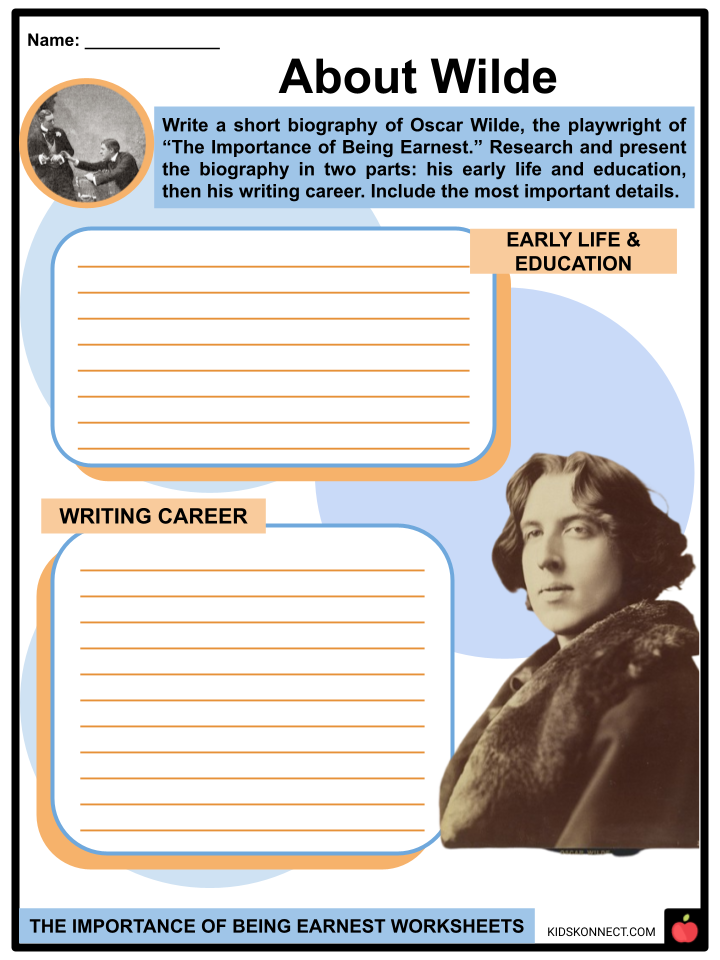
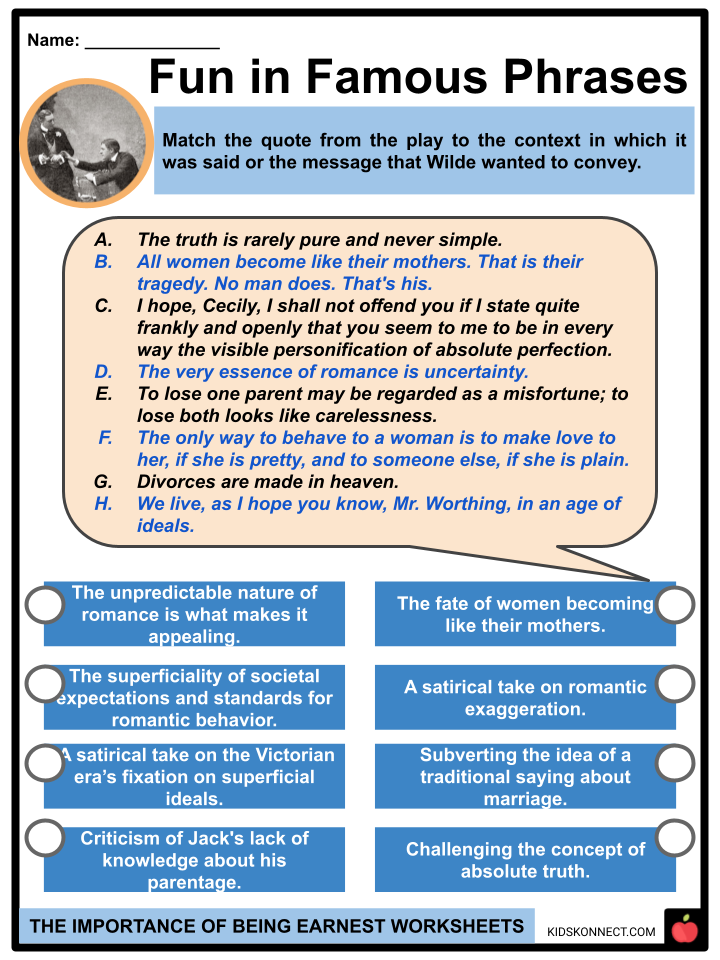
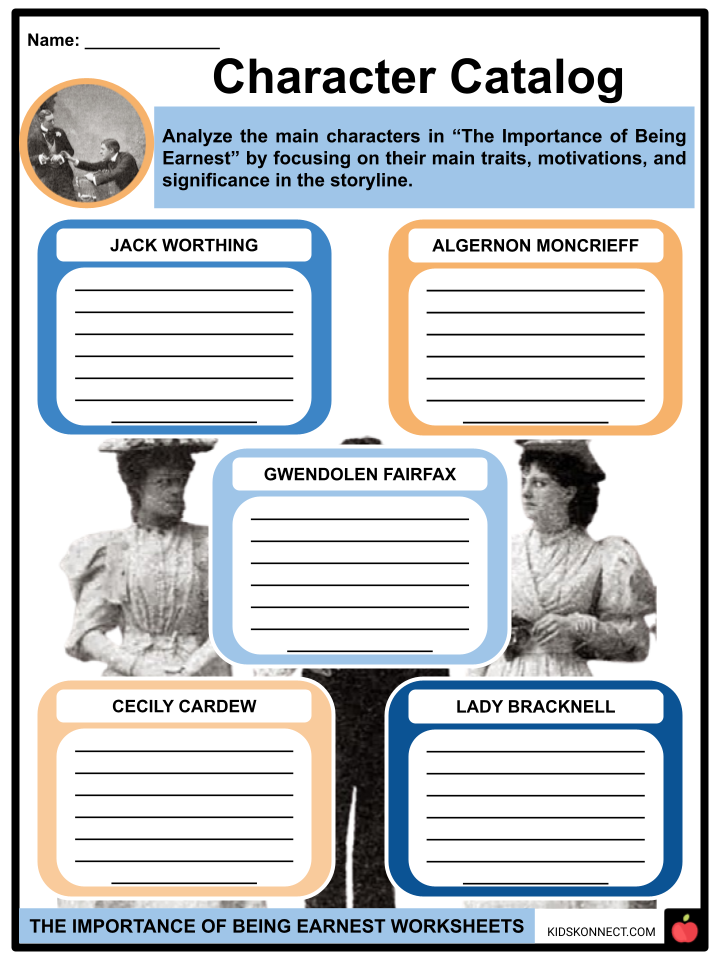
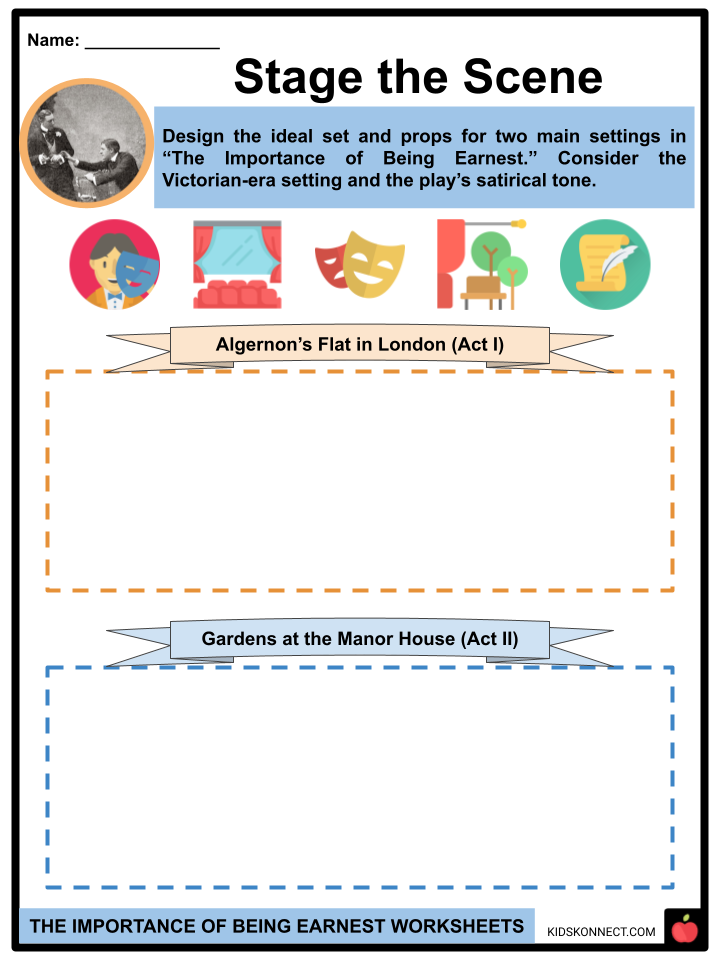
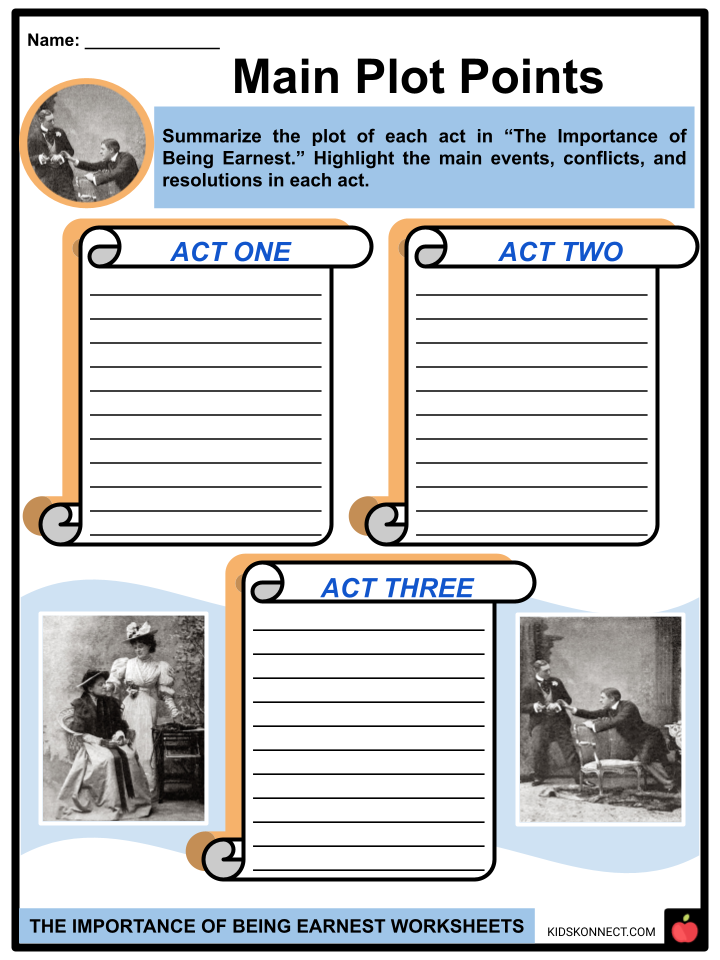
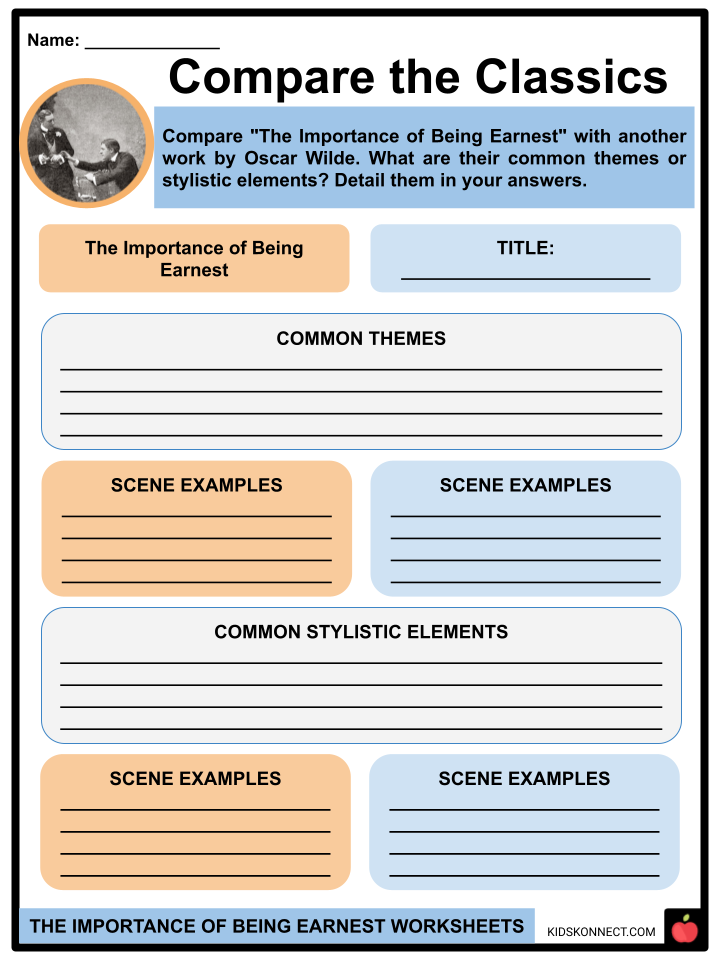
Complete List of Included Worksheets
Below is a list of all the worksheets included in this document.
- Theater studies: The Importance of Being Earnest Facts
- About Wilde
- Character Catalog
- Fun in Famous Phrases
- Wit and Words
- Stage the Scene
- Main Plot Points
- A New Curtain Call
- Time-Traveling Tales
- Compare the Classics
- Extended Learning
Frequently Asked Questions
What is the main theme of “The Importance of Being Earnest”?
The main theme of the play is satire, particularly focused on the hypocrisy and artificiality of the social norms and values of the Victorian era. Wilde uses humor and wit to criticize the upper class and their obsession with trivial matters.
Why is the play titled “The Importance of Being Earnest”?
The title is a play on words, as “Ernest” is a name, but it also conveys the concept of being earnest or truthful. The characters in the play often use the name “Ernest” as an alter ego to escape social obligations and create humorous situations.
How does the play explore the concept of identity and deception?
The play explores identity and deception through the use of false names and identities. Characters create imaginary personas to escape social constraints, leading to comedic misunderstandings. The theme highlights the superficial nature of societal expectations and the masks people wear to fit in.
What role does satire play in “The Importance of Being Earnest”?
Satire is a prominent element in the play, as Wilde satirizes the social customs, moral values, and etiquette of the Victorian society. He mocks the trivial concerns of the upper class and exposes the absurdities of their behavior, using wit and humor to criticize societal norms.
How does the play address the institution of marriage?“
“The Importance of Being Earnest” satirizes the institution of marriage by portraying it as a social contract based on superficial qualities rather than genuine love. Characters in the play engage in deceptive practices to secure advantageous marriages, highlighting the materialistic and hypocritical aspects of Victorian courtship and matrimony.
Link/cite this page
If you reference any of the content on this page on your own website, please use the code below to cite this page as the original source.
Use With Any Curriculum
These worksheets have been specifically designed for use with any international curriculum. You can use these worksheets as-is, or edit them using Google Slides to make them more specific to your own student ability levels and curriculum standards.








